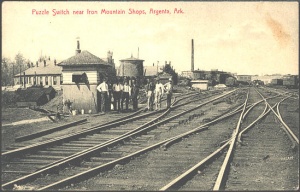Difference between revisions of "Argenta"
| (3 intermediate revisions by the same user not shown) | |||
| Line 1: | Line 1: | ||
| − | [[Image:Argenta-puzzle-switch.jpg|thumb|Puzzle Switch near Iron Mountain Railway Shops in Argenta.]] | + | [[Image:Argenta-puzzle-switch.jpg|thumb|300px|Puzzle Switch near Iron Mountain Railway Shops in Argenta.]] |
'''Argenta''' is the original name for [[North Little Rock]]. Argenta is a derivation of the Latin word for silver: "argentum." The city took this name from 1904 to 1917 because of the [[Kellogg Silver Mine]] operated by the Southwest Arkansas Mining Company ten miles to the north. The town street plan was developed by [[Thomas W. Newton Sr.]], leader of the silver mining operation. | '''Argenta''' is the original name for [[North Little Rock]]. Argenta is a derivation of the Latin word for silver: "argentum." The city took this name from 1904 to 1917 because of the [[Kellogg Silver Mine]] operated by the Southwest Arkansas Mining Company ten miles to the north. The town street plan was developed by [[Thomas W. Newton Sr.]], leader of the silver mining operation. | ||
| Line 22: | Line 22: | ||
==External links== | ==External links== | ||
| + | [[Category:Argenta]] | ||
[[Category:Neighborhoods]] | [[Category:Neighborhoods]] | ||
Latest revision as of 13:12, 8 February 2010
Argenta is the original name for North Little Rock. Argenta is a derivation of the Latin word for silver: "argentum." The city took this name from 1904 to 1917 because of the Kellogg Silver Mine operated by the Southwest Arkansas Mining Company ten miles to the north. The town street plan was developed by Thomas W. Newton Sr., leader of the silver mining operation.
Once growth stalled the town became dilapidated and buildings and homes fell out of repair in the later half of the twentieth century. The area had high crime rates and poor property values. In the early nineties, plans were made to revitalize the neighborhood under the Main Street Arkansas plan.
Main Street Arkansas is an organization that provides historic neighborhoods across the state with the intellectual resources they need to begin restoring their own areas. The program supplies a neighborhood with a representative contractor, architect, or interior designer, based on need, but encourages the neighborhood’s residents to pool together its own financial resources, and operate on its own efforts. The Main Street Arkansas plan has four points: design, organization, promotion, and economic restructuring.
The Argenta neighborhood became organized with its own board of directors. They received appropriate funding to repair the infrastructure in 1998. The plan was to create a neighborhood that could promote its own economic growth with a diverse range of inhabitants—businesses, artists, residents, musicians, etc.
The Argenta Community Development Corporation, which was founded in 1992, works on raising funds to purchase and renovate historic houses, one at a time. This group focuses on the idea that home ownership will improve the quality of life in their neighborhood. The CDC has seen significant improvement due to their years of work:
"To date we have renovated and constructed 162 residential and commercial properties including a 56-unit apartment complex investing over $13 million in downtown North Little Rock's renewal efforts. Through our work the Argenta Neighborhood was designated as National Register Historic District in 1993. Property values have soared more than 200% and the crime rate is one of the lowest in North Little Rock."
Since their creation in 1992, they have added on programs to their organization, giving them the resources to promote building green, affordable homes. The efforts of the Main Street program and the Community Development Corporation have changed the Argenta neighborhood from a dilapidated eyesore on the river to a much desired, high end place to live near all the activities of downtown Little Rock.
Leadership is also being exercised by the Downtown Argenta Council, which was formed in 2008.
References
- Jake Sandlin, "Argenta's Revival in Full Bloom," Arkansas Democrat-Gazette, April 4, 2009.
